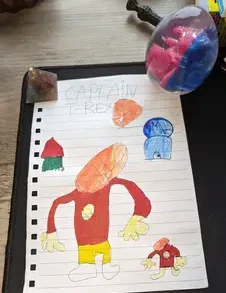a state preschool but the class was experimental. The aim was to introduce the Montessori education methodology to the mainstream preschool system in the region. The class was experimental and its methodology was to be implemented in more preschools if successful.
This experience inspired me to make further research and write the below article.
Who was Maria Montessori?
Maria Montessori was an Italian physician and educator who dedicated her life to the study of children’s psychology. She developed a unique approach to education that was based on self-directed activities, hands-on learning, and a deep respect for the individual child’s development.
Montessori believed that all children possess an “inner teacher”. To her philosophy, the role of the educator is to help nurture the potential within each student. Her educational methods have been adopted by thousands of schools around the world. This makes Maria Montessori one of the most influential figures in modern education.
There is over 20,000 Montessori schools in more than 110 countries around the world. This educational philosophy has become increasingly popular today. Many parents who want to give their children a well-rounded and enriching education see the benefits of Montessori.
What is Montessori education methodology?
Montessori education is an innovative approach to teaching and learning that was created by Dr. Maria Montessori in the late 19th century. It is based on the belief that children are naturally curious and creative, and that their development should be guided by a carefully designed learning environment. Children have an innate desire to learn, and are capable of doing so at their own pace.
The Montessori method focuses on individualized instruction, as well as promoting critical thinking and problem-solving skills. It also emphasizes the importance of learning through exploration and discovery. In a Montessori classroom, children are encouraged to work independently and collaboratively, and to develop their own interests and sense of responsibility. The goal is to foster a love of learning and to nurture each child’s unique gifts and talents. This type of learning allows children to explore their environment and discover knowledge at their own level of understanding, rather than having it handed down from a teacher.
Material and activities
The Montessori approach uses special materials and activities designed to meet the needs of each individual child. For example, in a language lesson, children may learn how to spell with small wooden blocks, or explore a variety of literature in a reading corner. In mathematics, they may use hands-on materials such as counting rods and money boxes. Montessori also stresses the importance of fostering self-esteem and encouraging creativity by giving children opportunities to explore their interests and make their own choices.
The Montessori philosophy of education takes into account the many aspects of child development, including physical, intellectual, emotional, social, spiritual, and psychological growth. By using age-appropriate activities, it provides children with an opportunity to build essential life skills such as independence, decision-making, communication, problem-solving, and interpersonal relationships.
At the same time, it helps them to become active participants in their own learning by introducing them to challenging tasks and helping them to develop their own methods of understanding. Finally, by focusing on the individual needs of each child, Montessori supports a strong sense of self-confidence and encourages creativity and exploration.
Freedom and exploration
The emphasis in a Montessori classroom is on developing children’s natural curiosity, creative problem-solving skills, and ability to think independently. Children are encouraged to explore, question and learn in a collaborative environment with their peers. They are also given freedom to choose activities based on their individual interests and preferences, allowing them to learn through discovery and exploration.
From a psychological perspective, Montessori educates children in ways that stimulate their brain development, fostering an appreciation for learning that will serve them well throughout their lives. By emphasizing independence and allowing children to follow their interests, they develop self-confidence and positive self-image. The sense of responsibility inherent in a Montessori education also helps children understand the importance of discipline and respect for themselves and others.
Montessori education helps to prepare children for future success by teaching them the essential skills needed for academic success. Those are concentration, critical thinking, problem solving and collaboration. By encouraging children to become self-directed learners, they are able to take ownership of their learning process and develop a lifelong love for learning.
Searching for a Montessori school
When searching for a Montessori school, it is important to find one that reflects Maria Montessori’s vision and adheres to her methods. Start by researching schools in your area and learning about their philosophy and curriculum. It can be helpful to reach out to parents whose children have attended the school to get an understanding of the quality of the program.
When touring schools, pay attention to the atmosphere. You should look for an environment that is warm, supportive and encourages children to explore independently. The classroom materials should be stimulating, allowing students to make choices as they learn. Ask questions about the training and qualifications of teachers to ensure they are knowledgeable about children’s psychology and able to use Montessori methods effectively. Ultimately, you want to find a school that will nurture your child’s individual growth and development.
Is Montessori a good fit for every child?
The Montessori education is being praised for its positive effects on the overall development of children. However, there are some aspects of Montessori methodology that could be seen as a disadvantage. One of the main issues with Montessori is that it relies heavily on a child’s self-directed learning and decision making. This can be difficult for younger children to grasp. Additionally, Montessori emphasizes free movement and activity in the classroom. This can be difficult to keep children focused and engaged in their work. Another concern is that while the Montessori approach emphasizes exploration and discovery. It lacks in some of the more structured elements of traditional education, such as standardized testing.
Evaluate
Not every child is a good fit for the Montessori education system. It is important to evaluate your child’s psychology and learning style before committing to a Montessori school. Some children may have difficulty with the unstructured environment, or the large class sizes and the lack of one-on-one instruction. Additionally, the philosophy of Montessori schools may not suit every child’s individual needs. It can be too structured or too loose for some. Parents should carefully consider their child’s individual needs and goals before making a decision about the best education for them.
It is important to note that the Montessori approach to education is not without its critics. While many parents and educators are enthusiastic about the Montessori method, others question its effectiveness and long-term outcomes. One of the main criticisms of Montessori education is that it relies heavily on individualized learning. This can leave some children behind if they do not have the appropriate level of self-discipline and motivation. Additionally, because children are free to work at their own pace, they may develop a sense of complacency or lack of engagement in their education.
Too much or no enough structure?
Another common criticism of the Montessori approach is that it does not provide enough structure for children. Can this be damaging to their development? Children learn best when they are provided with guidance and expectations. Research has shown that when there is too much freedom in the classroom, it can lead to confusion and anxiety. Furthermore, Montessori classrooms often have mixed age groups. This can be problematic for younger children who need more concrete instruction and support.
Finally, there is concern that the Montessori approach does not take into account the social, emotional, and cognitive needs of children as they develop. This style of learning may encourage creativity and independent thinking. However, some believe it does not focus enough on helping children develop skills such as cooperation and empathy. Without these key developmental components, children may not be able to function optimally in social situations or succeed in other academic areas.
Wherefore you might ask yourself the following questions:
Q: What kind of adults do children educated with Montessori become?
A: Children educated with Montessori develop skills such as self-motivation, independent learning, problem-solving, creativity, and collaboration. This type of education is based on understanding the psychology of children and their stages of development. This helps them to become emotionally balanced, self-disciplined, and confident individuals. Montessori education promotes an appreciation for knowledge, a love of learning, and the ability to think critically. This can result in a positive attitude towards life as an adult.
Q: Should some aspect of Montessori education methodology be in use in mainstream schools?
A: Many educational professionals believe that the Montessori approach to teaching has many advantages, particularly for younger children. The Montessori method promotes independence, builds self-confidence and encourages children to develop their own learning styles. Furthermore, it is based on principles of child psychology, which suggest that children learn best through hands-on activities and self-paced learning. Thus, while there are those who advocate for a more traditional approach to teaching, there is growing evidence that the Montessori method could be beneficial if implemented in mainstream schools.
Overall, while the Montessori approach has its advantages, parents should carefully consider whether it is the best fit for their child’s. It is important to discuss any concerns with a qualified professional who is familiar with children psychology to ensure that the educational path you choose is tailored to the individual child’s needs.
Conclusion
Ultimately, parents should make decisions about their child’s education based on their child’s individual needs and interests. While a Montessori education offers many advantages, it is not necessarily the best fit for every child. Consider your child’s unique learning style, personality, and developmental level when choosing an educational path. If your child thrives in collaborative learning environments, enjoys hands-on activities, and seeks a sense of independence and autonomy, then a Montessori education may be right for them. With its focus on exploration and self-directed learning, the Montessori method is designed to nurture a child’s natural curiosity and foster growth in all areas of development, including physical, cognitive, social, and emotional. Before deciding, be sure to consult with a qualified children’s psychologist to help you determine the best choice for your child.









